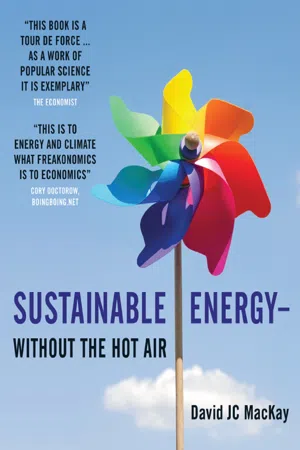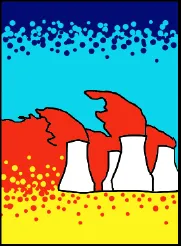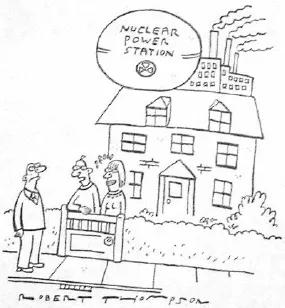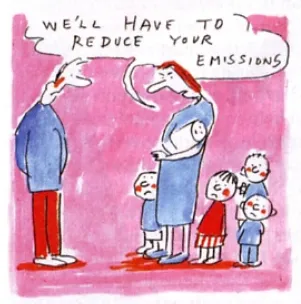![]()
Part II
Making a difference
![]()
19 Every BIG helps
We’ve established that the UK’s present lifestyle can’t be sustained on the UK’s own renewables (except with the industrialization of country-sized areas of land and sea). So, what are our options, if we wish to get off fossil fuels and live sustainably? We can balance the energy budget either by reducing demand, or by increasing supply, or, of course, by doing both.
Have no illusions. To achieve our goal of getting off fossil fuels, these reductions in demand and increases in supply must be big. Don’t be distracted by the myth that “every little helps.” If everyone does a little, we’ll achieve only a little. We must do a lot. What’s required are big changes in demand and in supply.
“But surely, if 60 million people all do a little, it’ll add up to a lot?” No. This “if-everyone” multiplying machine is just a way of making something small sound big. The “if-everyone” multiplying machine churns out inspirational statements of the form “if everyone did X, then it would provide enough energy/water/gas to do Y,” where Y sounds impressive. Is it surprising that Y sounds big? Of course not. We got Y by multiplying X by the number of people involved – 60 million or so! Here’s an example from the Conservative Party’s otherwise straight-talking Blueprint for a Green Economy:
“The mobile phone charger averages around ... 1W consumption, but if every one of the country’s 25 million mobile phones chargers were left plugged in and switched on they would consume enough electricity (219 GWh) to power 66 000 homes for one year.”
66 000? Wow, what a lot of homes! Switch off the chargers! 66 000 sounds a lot, but the sensible thing to compare it with is the total number of homes that we’re imagining would participate in this feat of conservation, namely 25 million homes. 66 000 is just one quarter of one percent of 25 million. So while the statement quoted above is true, I think a calmer way to put it is:
If you leave your mobile phone charger plugged in, it uses one quarter of one percent of your home’s electricity.
And if everyone does it?
If everyone leaves their mobile phone charger plugged in, those chargers will use one quarter of one percent of their homes’ electricity.
The “if-everyone” multiplying machine is a bad thing because it deflects people’s attention towards 25 million minnows instead of 25 million sharks. The mantra “Little changes can make a big difference” is bunkum, when applied to climate change and power. It may be true that “many people doing a little adds up to a lot,” if all those “littles” are somehow focused into a single “lot” – for example, if one million people donate £10 to one accidentvictim, then the victim receives £10 million. That’s a lot. But power is a very different thing. We all use power. So to achieve a “big difference” in total power consumption, you need almost everyone to make a “big” difference to their own power consumption.
“We were going to have a wind turbine but they’re not very efficient”
Figure 19.1. Reproduced by kind permission of PRIVATE EYE / Robert Thompson www.private-eye.co.uk.
So, what’s required are big changes in demand and in supply. Demand for power could be reduced in three ways:
1. by reducing our population (figure 19.2);
2. by changing our lifestyle;
3. by keeping our lifestyle, but reducing its energy intensity through “efficiency” and “technology.”
Supply could be increased in three ways:
1. We could get off fossil fuels by investing in “clean coal” technology. Oops! Coal is a fossil fuel. Well, never mind – let’s take a look at this idea. If we used coal “sustainably” (a notion we’ll define in a moment), how much power could it offer? If we don’t care about sustainability and just want “security of supply,” could coal offer that?
2. We could invest in nuclear fission. Is current nuclear technology “sustainable”? Is it at least a stop-gap that might last for 100 years?
3. We could buy, beg, or steal renewable energy from other countries – bearing in mind that most countries will be in the same boat as Britain and will have no renewable energy to spare; and also bearing in mind that sourcing renewable energy from another country doesn’t magically shrink the renewable power facilities required. If we import renewable energy from other countries in order to avoid building renewable facilities the size of Wales in our country, someone will have to build facilities roughly the size of Wales in those other countries.
The next seven chapters discuss first how to reduce demand substantially, and second how to increase supply to meet that reduced, but still “huge,” demand. In these chapters, I won’t mention all the good ideas. I’ll discuss just the big ideas.
Cartoon Britain
To simplify and streamline our discussion of demand reduction, I propose to work with a cartoon of British energy consumption, omitting lots of details in order to focus on the big picture. My cartoon-Britain consumes energy in just three forms: heating, transport, and electricity. The heating consumption of cartoon-Britain is 40 kWh per day per person (currently all supplied by fossil fuels); the transport consumption is also 40 kWh per day per person (currently all supplied by fossil fuels); and the electricity consumption is 18 kWh(e) per day per person; the electricity is currently almost all generated from fossil fuels; the conversion of fossil-fuel energy to electricity is 40% efficient, so supplying 18 kWh(e) of electricity in today’s cartoon-Britain requires a fossil-fuel input of 45 kWh per day per person. This simplification ignores some fairly sizeable details, such as agriculture and industry, and the embodied energy of imported goods! But I’d like to be able to have a quick conversation about the main things we need to do to get off fossil fuels. Heating, transport, and electricity account for more than half of our energy consumption, so if we can come up with a plan that delivers heating, transport, and electricity sustainably, then we have made a good step on the way to a more detailed plan that adds up.
While the footprint of each individual cannot be reduced to zero, the absence of an individual does do so.
Chris Rapley, former Director of the British Antarctic Survey
We need fewer people, not greener ones.
Daily Telegraph, 24 July 2007
Democracy cannot survive overpopulation. Human dignity cannot survive overpopulation.
Isaac Asimov
Figure 19.2. Population growth and emissions... Cartoon courtesy of Colin Wheeler.
Having adopted this cartoon of Britain, our discussions of demand reduction will have just three bits. First, how can we reduce transport’s energy-demand and eliminate all fossil fuel use for transport? ...



